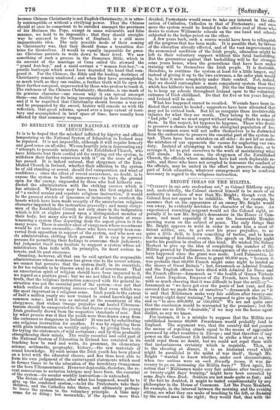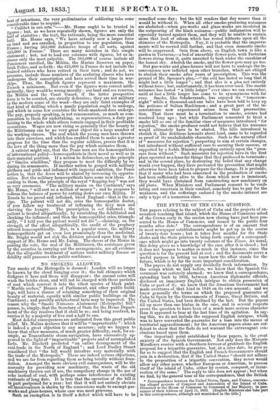BRIGHT IDEAS ON THE MILITIA.
" CIIILIBET in sus arte eredendum est," as Colonel Sibthorp says; and, undoubtedly, the Colonel showed himself to be more of an authority in matters of war than Mr. Bright ; though even the Colonel does not appear to be infallible. When, for example, he assumes that on the appearance of an enemy Mr. Bright would run away, he evidently mistakes the character of the man. An experienced recruiting-sergeant would set the Colonel right, es- pecially if he saw Mr. Bright's demeanour in the House of Com- mons, and most especially if he saw the honourable Member growing warm on the subject of peace. The only things that Mr. Bright appears to want in order to make him a most ef- ficient soldier, are, to get over his peace prejudice, to ac- quire a little drill, to learn something of tactics, and to know the meaning of historical events. His speech on Monday night marks his position in studies of this kind. He wished Mr. Sidney Herbert to give up the idea of completing the number of the Militia granted by Parliament, in consequence of the events which have happened since the grant was made. Lord Palmerston, he said, had persuaded the House to grant 80,000 men, " because it was probable that 60,000 French might some night be landed on the shores of Great Britain"; but, forasmuch as Admiral Dundas and the English officers have dined with Admiral La Susse and the French officers—forasmuch as " the health of Queen Victoria and Louis Napoleon, Emperor of the French, have been drunk with so much cheering that it was difficult to hear the artillery"— forasmuch as " we have got over the panic of last year, and dis- covered that we made fools of ourselves"—forasmuch also as "it is said that Militiamen make very fair soldiers after twenty-one or twenty-eight days' training," he proposed to give up the Militia, and so " to save 400,0001. or 500,0001.' We are not quite sure that the conclusion would be warranted by the premises ; but the premises are as little "desirable," if we may use the house-agent diaget, as any we know. For instance, it is a mistake to suppose that the Militia was established because 60,000 Frenchmen would probably land in England. The argument was, that the country did not possess the means of repelling attack equal to the means of aggression possessed by other countries in Europe ; and that therefore if 'any power on the Continent felt inclined to strike a blow at us, we could repel them no doubt, but we could not repel them with that instantaneous certainty which is requisite. Then, as to the cheering at dinner, it is an historical event which might be paralleled in the midst of war itself ; though Mr. Bright " wanted to know whether, under such circumstances, when two nations were on such friendly terms, it was ne- cessary to go on increasing the Militia force ?" Then again, his notion that " Militiamen make very fair soldiers after twenty-one or twenty-eight days' training," might have been corrected by some Boys Own Book. Soldiers are not made quite so fast ; and if the fact be doubted, it might be tested experimentally by any philosopher in the House of Commons. Let the Peace Members, for example, in the interval between the morning and the evening sitting, see what they can make of touching to the left, or dressing by the second man to the right; they would find, that with the
considerable time to acquire.
" Cuilibet in su5. arte "—Mr. Hume ought to be trusted in figures ; but, as we have repeatedly shown, figures are only the half of statistics ; the text, the rationale, being the more essential hale. Mr. Hume says, " We have actually now a larger force on land and sea enrolled, in proportion to our population, than France ; having 385,000 defensive troops of all sorts, against 425,000 in Franoe." There are many mistakes in this simple statement ; but, not to load our columns with figures, let us in- stance only the most palpable. The 385,000 of course include all Pensioners enrolled, the Militia, the Marine Reserves on paper, Irish Police, and so forth : the 425,000 in France do not include the trained soldiers who have retired in their turn ; and do not, we presume, include those numbers of the seafaring classes who have undergone their conscription and have served their time in war- ships. Thus, the English figures represent a maximum, the French a minimum. But even if the figures were correct arith- metically, they would be wrong morally : our land and sea reserves, the Militia and the Coast Guard, if the latter prospective force is to be counted, are strictly defensive; they are not military in the modern sense of the word—they are only faint examples of that kind of drilling which a manly population ought to undergo, and which in some few countries the whole manhood does undergo. The pay, properly speaking, is not remuneration, so much as com- pensation to them for undertaking, as representatives, a duty per- taining to the whole while others remain engaged in their profitable avocations. Wages are now rising so generally that the bounty to the Militiaman can be no very great object for a large number of the working classes. The zeal which the young men have thrown into their exercises, and which has enabled them to make a greater progress for the time than the regular soldiers, proves that it is the love of the thing more than the pay which animates them.
A satirist might say, that the Peace men are the homoeopathists of international policy—homoeopathists in their moral as well as in their material position. If a nation be defenceless, on the principle
of " similibus," they propose to meet the difficulty by re- ducing its armaments. If another nation be gorged with military plethora and pride and inflamed with imperial ambition, the Peace notion is, that the fever will be abated by increasing its opportu- nities. But the military homoeopathists have some new ideas. Ac- cording to them, the principle of the royal " flogging-boy " was not so very erroneous. "The military mania on the Continent," says Mr. "tame, " will cost us a million of money "; and he proposes to redress the balance of power by cutting down our own Militia. If Russia be too proud and inflamed, bleed England—that is the re- cipe. The patient will not die, cries the homoeopathic doctor, if you follow my treatment of inflaming the fiery man and starving the hungry. The prescription is not followed ; the patient is treated allopathically, by nourishing the debilitated and checking the inflamed ; and then the homoeopathist cries, triumph- antly, " I told you the patient would not die ",—claiming, on the strength of the effect allopathically, the credit of the prophecy uttered homoeopathically. Bat, in a popular sense, the military homoeopathists get on even less promisingly than the medicinal. Mr. Bright would not risk the division pressed upon him by the support of Mr. Hume and Mr. Laing. The cheers of the House in passing the vote, the zeal of the Militiamen, the assistance given by the counties in carrying out the arrangements, are all evidence that the allopathic treatment of nations under military disease or debility still possesses the public confidence.



























 Previous page
Previous page